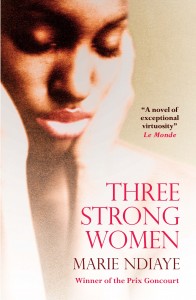Published by MacLehose Press 26 April 2012
288pp, hardback, £18.99
Reviewed by Zoe Fairbairns
‘Three women who almost have it all…’ Thus the breathless blurb, as if the publishers of Three Strong Women by Marie NDiaye can’t wait to market this complex, sorrowful book as a high-concept airport blockbuster.
None of the eponymous women is anywhere near having it all. 45-year-old Norah has some of it: a career as a lawyer, a much-loved child and a flat in Paris, albeit somewhat overcrowded with her lover and his daughter. Norah abandons them all to answer a summons from her abusive father who lives in Senegal. Having murdered his latest wife and arranged for Norah’s brother to take the blame, he is in need of free legal assistance.
In the shadows of this toxic family home dwells the servant Khady Demba. Blink and you’ll miss her: when not serving food or looking after the many children casually spawned by Norah‘s father, she is barely visible. But later in the book (which is not so much a novel as three novellas, linked by a handful of crossover characters, and recurrent themes of neo-colonialism, domestic abuse and the trade in pretend rustic kitchens) Khady’s own story is told.
Of Senegalese origin, Khady has known the joys of a happy marriage and the satisfaction and independence of running a successful small business. But the death of her husband forces her on to the mercies of her in-laws, a charmless bunch who jeer at her for her childlessness and poverty. Finally her mother-in-law evicts her, with orders to make her way to France, where she is to find a Senegalese woman named Fanta who will look after Khady and give her money which must be sent back to the mother-in-law in recompense for her kindness. Khady’s quest for Fanta is a nightmare of overcrowded lorries, illegal refugee camps, forced prostitution and trust betrayed.
Fanta herself, far from ‘having it all’, doesn‘t even have a voice. Her story is told from the point of view of her husband, 43-year-old Frenchman Rudy Descas. His has been a disappointing life – he wanted to be an intellectual, not a kitchen salesman – but not as disappointing as Fanta’s. In Dakar she was poor but happily occupied as a teacher; inFrance her qualifications are not recognized, so she is stuck at home, assuaging her boredom by having sex with Rudy’s boss.
This Goncourt-prize-winning novel moves seamlessly but disconcertingly between painful realism and magic. Norah’s father spends his nights in a tree (how does he get up there, you wonder, this man who is so morbidly obese that he has difficulty walking?) Angels appear, buzzards bear messages, people fly. Europe is a place that can be reached from Africa by climbing over a barbed-wire fence with a home-made ladder. But such imagery, though often telling and enchanting, is no substitute for tighter plotting. Will Norah succeed in getting her brother acquitted and her father locked up as he deserves? How does Khady come to be working for Norah’s dad, and will Fanta ever be more to her than a bottle of fizzy orange? We don’t know. Little is resolved in this book. But Marie Ndiaye’s prose, translated by John Fletcher, is beautiful.

